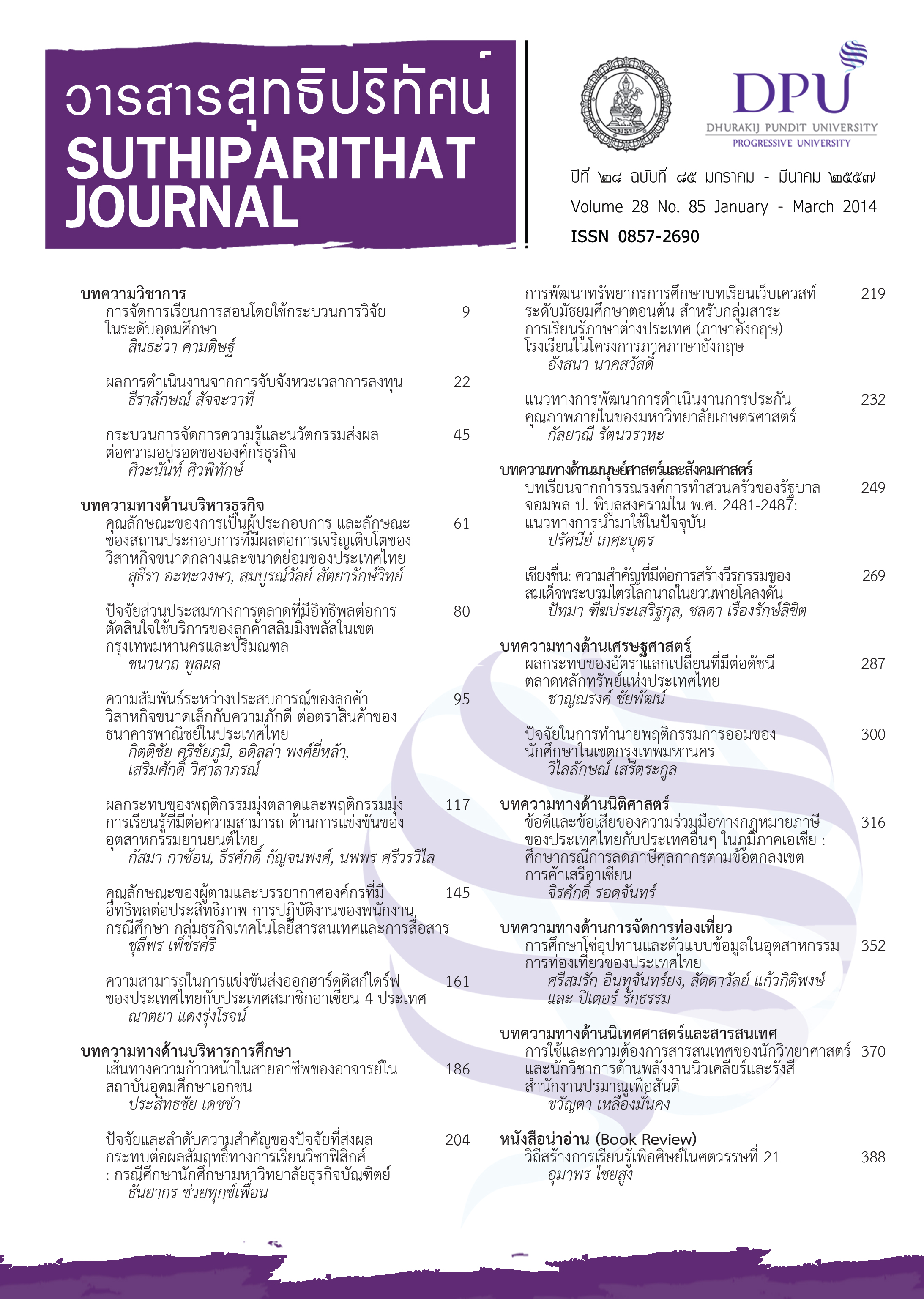กระบวนการจัดการความรู้และนวัตกรรมส่งผลต่อความอยู่รอดขององค์กรธุรกิจ
คำสำคัญ:
การจัดการความรู้, การสร้างนวัตกรรมบทคัดย่อ
องค์กรทั้งหลายทั่วโลกทุกวันนี้เผชิญกับความท้าทายที่ร่วมกันคือ ความจำเป็นที่จะต้องปรับปรุงการปฏิบัติงานของตนเพื่อให้ก้าวทันการเปลี่ยนแปลงที่เกิดขึ้นอย่างรวดเร็ว หากองค์กรใดไม่สามารถปรับตัวให้ทันต่อการเปลี่ยนแปลงที่กำลังเกิดขึ้นในสภาพแวดล้อมภายนอกและยังไม่สามารถสร้างสรรค์นวัตกรรมใดๆ องค์กรธุรกิจนั้นย่อมล่มสลาย สิ่งที่สะท้อนให้เห็นว่าองค์กรธุรกิจจะสามารถอยู่รอดต่อไปไดนั้น สังเกตได้จากการมีความสามารถในการผลิตสินค้าที่มีคุณภาพ การเพิ่มขึ้นของยอดขาย ความได้เปรียบทางการแข่งขันและการจ้างงานที่เพิ่มขึ้น จากการทบทวนวรรณกรรมที่เกี่ยวข้อง พบว่า การจัดการความรู้ในองค์กรมี 3 ระดับ ได้แก่ ระดับบุคคล ทีมหรือกลุ่มและระดับองค์กร โดยองค์กรที่มีความได้เปรียบทางการแข่งขันจะสามารถสร้าง (creation) มีการรักษาให้คงไว้ (maintain) การเพิ่มพูน (enhance) และการแบ่งปัน (share) ความรู้ภายในองค์กรและระหว่างองค์กรเพื่อสนับสนุน การดำเนินงานทางธุรกิจ หรือเพื่อการบรรลุวัตถุประสงค์ขององค์กร เนื่องจากการจัดการความรู้ที่ดี นั้นจะกลายเป็นเครื่องมือสำคัญที่ช่วยให้องค์กรนั้นๆ เกิดการปรับปรุงและสร้างสรรค์นวัตกรรมหรือสิ่งใหม่ๆ ที่มีประโยชน์และคุ้มค่าต่อการพัฒนาองค์กร แล้วในที่สุดจะนำไปสู่การช่วยให้องค์กรนั้นสามารถเติบโตทางธุรกิจได้อย่างมีประสิทธิภาพและยั่งยืน สามารถเพิ่มศักยภาพในการแข่งขันระดับโลก นั่นคือความอยู่รอดขององค์กรธุรกิจนั่นเอง
เอกสารอ้างอิง
ภัทรพงศ์ อินทรกำเนิน. (2547). การพัฒนาความสามารถทางเทคโนโลยีและนวัตกรรมของประเทศไทย. เอกสารสัมมนาวิชาการ , หน้า3
Florida , R. , Irene, T. (2004). Europe in creative age New York, Wiley.
Morris, M. H. and D. F. Kuratko (2002). Corporate Entrepreneurship. OH: South-Western College Publishers
Schumpeter, J. (1996). The theory of economic development Cambridge, MA: Harvard University Press.
Ar, Ilker Murat; Birdogan Baki. (2011). Antecedents and performance impacts of product versus process innovation. European Journal of Innovation Management, 14(2), 172-206.
Kannabiran, Ganesan and Chandrasekar Pandyan. (2010). Enabling role of governance in strategizing and implementing KM. Journal of Knowledge Management 14(3), 335-347.
Peinl, Rene and Maier, Ronald. (2011). SimKnowledge--Analyzing impact of knowledge management measures on team organizations with multi agent-based simulation. Information Systems Frontiers, 13(5), 621-636.
Andreeva, Tatiana; Kianto, Aino. (2011). Knowledge processes, knowledge-intensity and innovation: a moderated mediation analysis. Journal of Knowledge Management, 15(6), 1016-1034.
Alipour, Farhad; Karimi, Roohangiz. (2011). Mediation Role Of Innovation And Knowledge Transfer In The Relationship Between Learning Organization And Organizational Performance. International Journal of Business and Social Science2, (19): n/a
Allameh, Sayyed Mohsen; Abbas, Saba Khadem. (2010). The Relationship Between Knowledge Management Practices And Innovation Level In Organizations: Case Study Of Sub-Companies Of Selected Corporations In The City Of Esfahan. Journal of Business Case Studies, 6(1), 89-97.
Jasimuddin, Sajjad M. (2008). A holistic view of knowledge management Strategy, Journal of Knowledge Management,12(2), pp. 57-66.
Jose Santos, Yves Doz and Peter Williamson (2004). Is your Innovation Process Global?. MIT Sloan Management Review, 10(3), 53.
L.R. Sayles (2007). The Innovation Process: An Organizational Analysis, Journal of Management Studies, 11(3), 190-193.
Luuk Klomp and George Van Leeuwen (2001). Linking Innovation and Firm Performance: A New Approach, Journal of the Economices of Business, 8(3), 343-364.
Marina du Plessis (2007).The Role of Knowledge Management in Innovation. Journal of Knowledge Management, 11(4), pp. 20-29.
Min Basadur and Garry A. Gelade (2006).The Role of Knowledge Management in the Innovation Process, The Authors Journal compilation, 15(1), p.59 - 75.
Sharma, Ravi S, Siddiqui, Aijaz, Atul, Singh, Rajdeep (2007). Leveraging Knowledge Management for Growth: A Case Study of Tata Consultancy. Journal of Information Technology Case and Appliction Research, 9(4), pp.29-65.
Seungkwon Fang, Kilpyo Hong, Gee Woo Bock and Ilhwan Kim (2002). Knowledge Management and Process Innovation: the Knowledge Transformation Path in Samsung SDI. Journal of Knowledge Management. 6(5), 479-485.
Simone Strambach (2002). Change in the Innovation Process: New Knowledge Production and competitive Cities-The case of Stuttgart. European Planning Studies. 10(2), 215-231.
Tiwana, A. (2000). The Knowledge Management Toolkit. International Journal of Management Reviews, 9(1), 1-51.
E Mustonen-Ollila, K Lyytinen ( 2003). Diffusion of Innovation Theory. Information Systems Journal Retrieved May 20 , 2013, From http://www.ciadvertising.org./studies/student/98_fall/theory/hornor/paper1.html
Ministry of Justice (2006). Knowledge Management Defined. from: http://www.justice.gov.nz/jsis/information-knowlege-management-guide/chapter-2.html
ดาวน์โหลด
เผยแพร่แล้ว
รูปแบบการอ้างอิง
ฉบับ
ประเภทบทความ
สัญญาอนุญาต
เนื้อหาและข้อมูลในบทความที่ลงตีพิมพ์ในวารสารสุทธิปริทัศน์ ถือเป็นข้อคิดเห็นและความรับผิดชอบของผู้เขียนบทความโดยตรงซึ่งกองบรรณาธิการวารสาร ไม่จำเป็นต้องเห็นด้วย หรือร่วมรับผิดชอบใด ๆ
บทความ ข้อมูล เนื้อหา รูปภาพ ฯลฯ ที่ได้รับการตีพิมพ์ในวารสารสุทธิปริทัศน์ ถือเป็นลิขสิทธิ์ของวารสารสุทธิปริทัศน์หากบุคคลหรือหน่วยงานใดต้องการนำทั้งหมดหรือส่วนหนึ่งส่วนใดไปเผยแพร่ต่อหรือเพื่อกระทำการใด ๆ จะต้องได้รับอนุญาตเป็นลายลักษณ์อักษรจากวารสารสุทธิปริทัศน์ก่อนเท่านั้น







